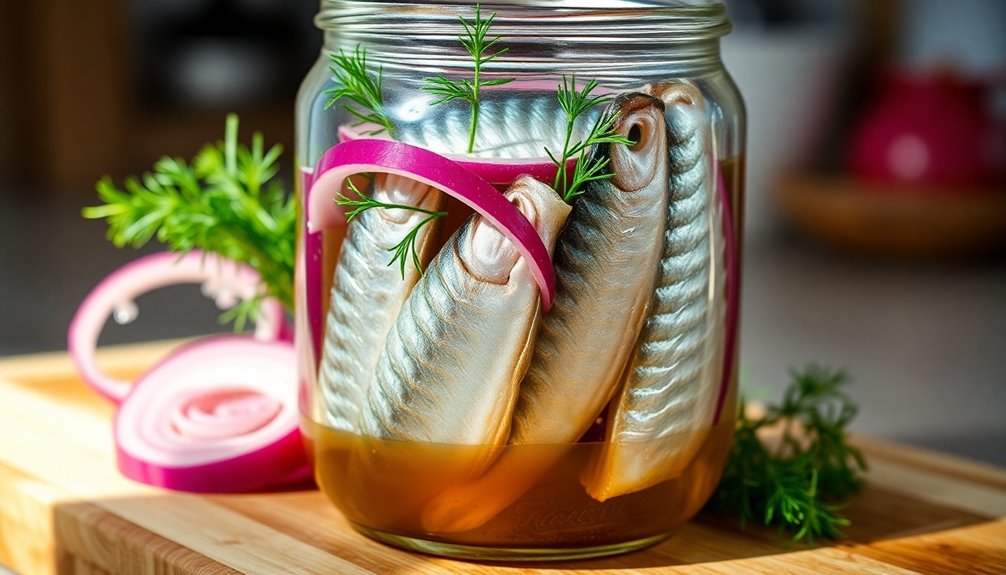Marinated herring combines rich flavors with a tangy, slightly sweet marinade, making it a culinary delight. With roots in Northern Europe, it's a staple in many traditions, especially in Ashkenazi Jewish cuisine. The fish is typically marinated in a mixture of vinegar, sugar, onions, and spices, enhancing its natural taste. You'll love how versatile it is—great on its own, in salads, or as part of a charcuterie board. Learn more about its history and preparation tips!
History
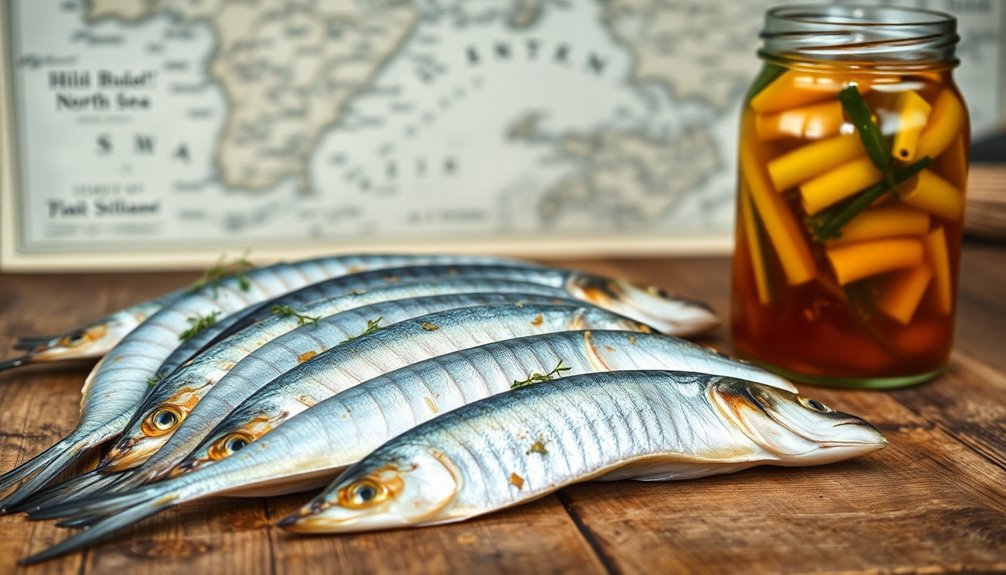
Since medieval times, pickled herring has been a staple in Northern Europe, serving not just as a food source but also as a means of preserving fish during meatless periods like Lent.
You might be surprised to learn that the Dutch curing method for herring was introduced to Scottish fishermen in 1801, enhancing preservation techniques.
Traditionally, herring was packed in barrels for year-round consumption, boosting its popularity. This preservation method ensured herring's significance across various European cultures.
The cultural significance of marinated herring extends to Ashkenazi Jewish cuisine and festive occasions in countries like Russia and Poland, where it symbolizes tradition and celebration.
Today, pickled herring remains cherished, connecting you to centuries of culinary history.
Recipe
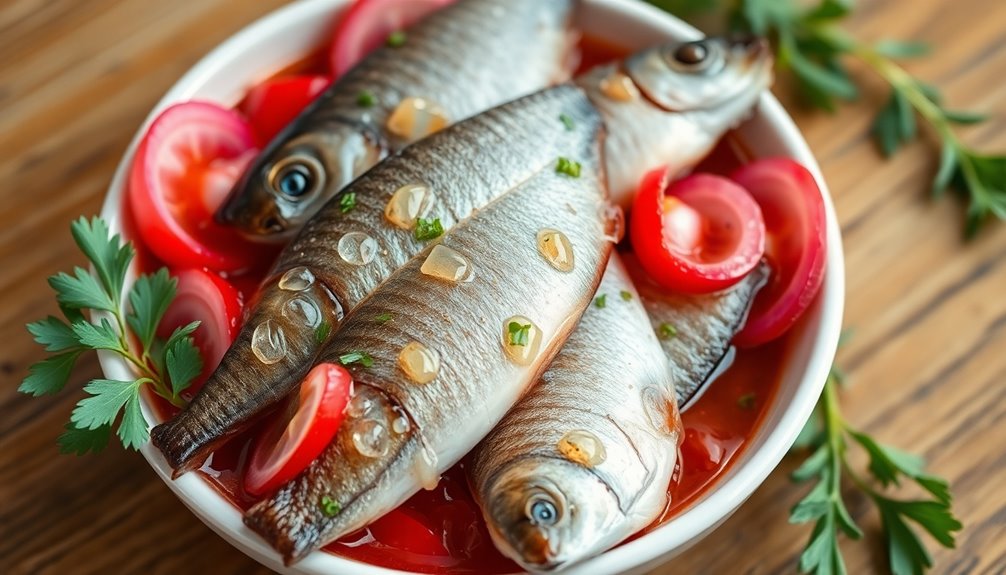
Marinated herring is a delightful dish that combines the rich flavors of the fish with a tangy and slightly sweet marinade. The process of marinating not only enhances the natural taste of the herring but also tenderizes it, making it a favorite in many culinary traditions.
Whether served as an appetizer or a part of a main course, this dish provides a unique taste experience that's sure to impress.
To create a well-balanced marinated herring, it's essential to use a blend of vinegar, sugar, and various spices. The addition of onions and fresh dill not only complements the fish but adds a refreshing aroma that elevates the overall flavor profile.
This recipe is perfect for gatherings and can be paired with crispy potatoes or served on toasted bread for an elegant touch.
Ingredients
- 4 herring fillets, cleaned and deboned
- 1 cup white vinegar
- ½ cup sugar
- 1 cup water
- 1 small onion, thinly sliced
- 1 tablespoon mustard seeds
- 1 tablespoon black peppercorns
- ½ cup fresh dill, chopped
- Salt to taste
Cooking Instructions
In a saucepan, combine the white vinegar, sugar, and water over medium heat, stirring until the sugar dissolves.
Add the mustard seeds, black peppercorns, and a pinch of salt. Allow the mixture to simmer for a few minutes, then remove it from heat and let it cool.
Once cooled, layer the herring fillets in a glass jar or container, adding the sliced onion and chopped dill in between the layers.
Pour the cooled marinade over the fish, ensuring it's fully submerged. Seal the container and refrigerate for at least 24 hours for optimal flavor absorption before serving.
Extra Tips
For the best results, choose high-quality fresh herring fillets, as their flavor will significantly impact the dish.
If you prefer a milder taste, you can adjust the amount of vinegar in the marinade.
Additionally, marinated herring can be stored in the refrigerator for up to a week, allowing you to prepare it in advance for gatherings.
Serve it with crusty bread or incorporate it into salads for a delightful twist on traditional recipes.
Cooking Steps
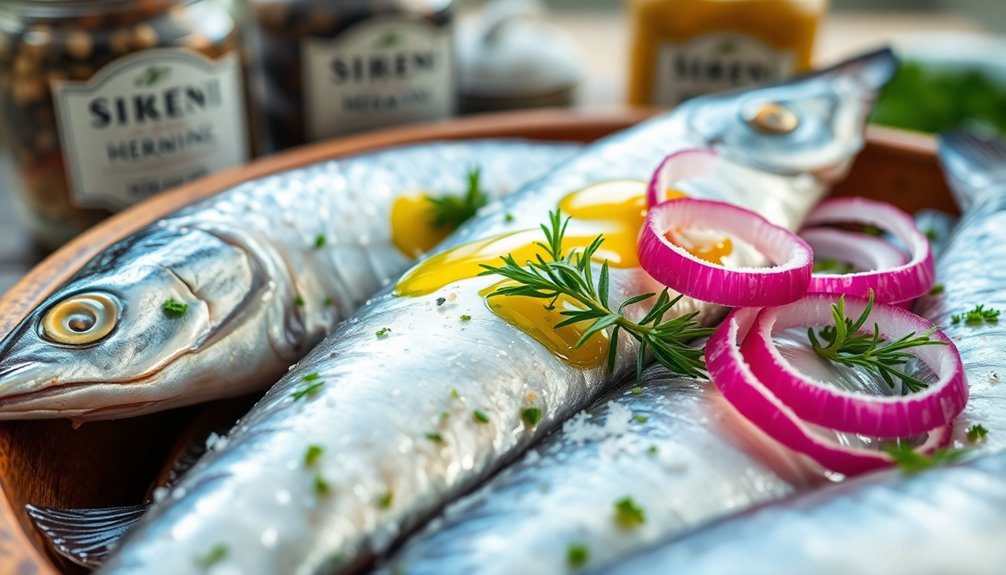
To get started with marinating herring, you'll first need to prepare the fillets and make a flavorful marinade.
Mix the ingredients thoroughly, then submerge the herring and let it refrigerate for at least 24 hours.
Once it's ready, serve it with fresh dill and adjust the seasoning to your taste.
Step 1. Prepare Herring for Marination
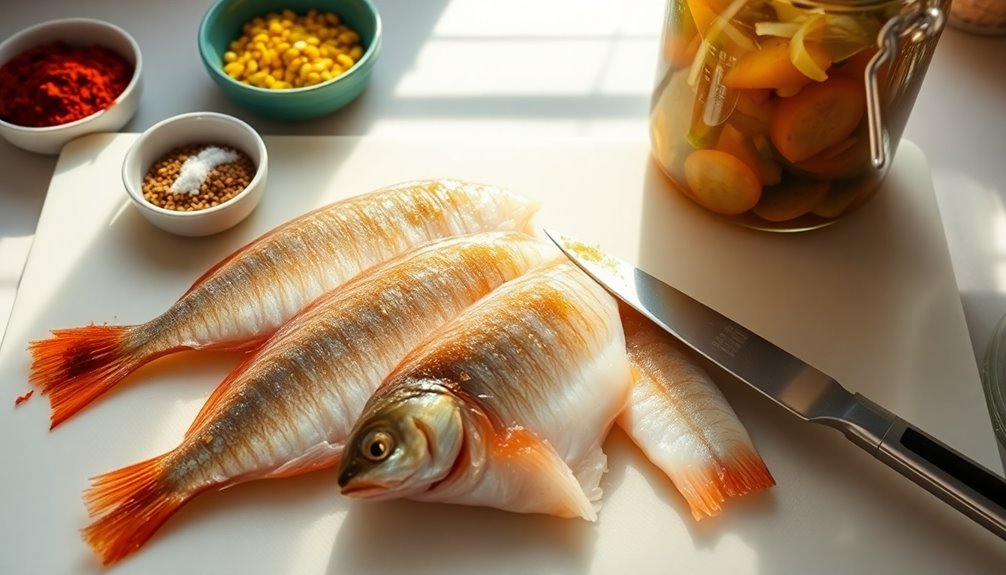
When preparing herring for marination, start by selecting fresh, responsibly sourced fish to ensure the best flavor.
Clean the herring thoroughly by removing the heads, guts, and bones. Rinse the fillets under cold water, making sure they're ready for marination.
To create a delicious Herring in Dill Marinade, combine vinegar, water, sugar, and spices like dill or onions. Submerge the cleaned fillets in this marinade, ensuring they're fully covered.
Refrigerate the herring for at least 24 hours to let the flavors infuse. After marination, you can enjoy your herring right away or store it in the refrigerator for up to three weeks.
This dish not only tastes great but is also a good source of nutrients, rivaling smoked fish.
Step 2. Mix Marinade Ingredients Thoroughly
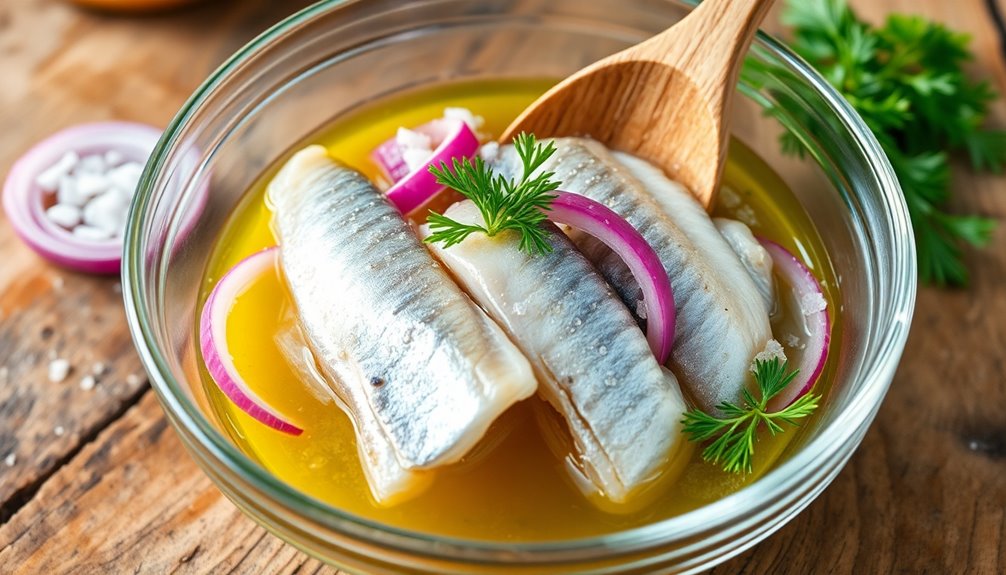
Start by gathering your marinade ingredients in a mixing bowl.
Combine equal parts vinegar and water, then add sugar to taste for a hint of sweetness that enhances the herring's natural flavors.
Next, sprinkle in a variety of spices, like dill, mustard seeds, and black peppercorns, which will elevate the overall flavor profile.
For an aromatic touch, finely chop some onions and mix them in; their flavor will infuse beautifully into the herring.
Make sure to mix everything thoroughly, promoting even distribution of flavors and ensuring that the fatty acids from the fish are complemented by the marinade.
This step is crucial for achieving a well-balanced and flavorful pickled herring.
Step 3. Refrigerate for 24 Hours

Refrigerating your marinated herring for a full 24 hours is key to unlocking its rich flavors. This time allows the fish to absorb the marinade fully, enhancing both taste and texture.
Make sure your herring is completely submerged in the marinade to ensure even flavor distribution. An airtight container is essential for storage; it keeps air out and maintains the freshness of your dish.
The vinegar, onions, and seasonings in your marinade will work their magic during this period, improving the overall flavor profile. Plus, the refrigeration helps firm up the herring, making it more enjoyable to eat.
Trust the process—this step is crucial for achieving that delicious, marinated result you're aiming for.
Step 4. Serve With Fresh Dill
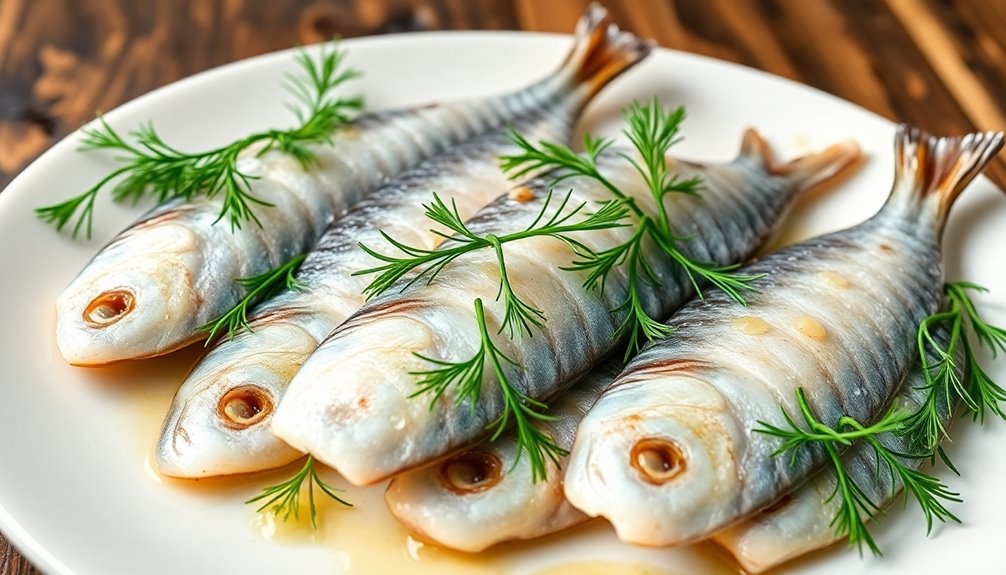
To elevate your marinated herring, consider serving it with fresh dill, which brings a vibrant herbaceous note that beautifully complements the dish.
Simply chop the dill finely and sprinkle it generously over the herring just before serving for a burst of freshness.
For added texture, you can mix the marinated herring with diced onions and a good amount of fresh dill in a salad or as a topping on crackers.
This combination not only enhances the flavor but also adds a delightful crunch.
You might also blend fresh dill into dressings or sauces to accompany the herring, creating a flavorful dip that enhances your overall dining experience.
Enjoy the balanced richness of herring with these light, aromatic flavors!
Step 5. Taste and Adjust Seasoning
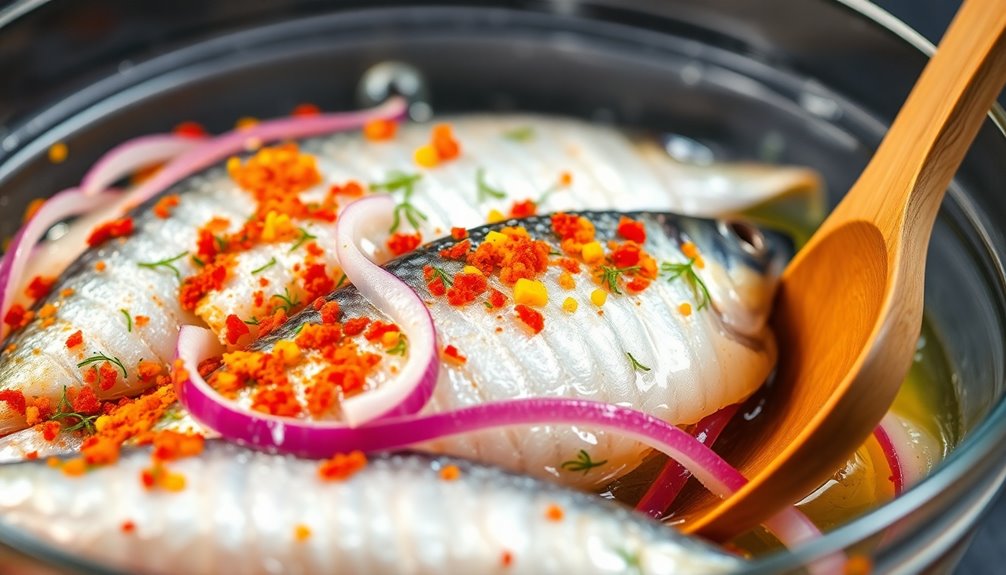
As you marinate the herring, it's essential to taste the dish periodically to ensure the seasoning is just right. You want the flavors to complement the fish without overpowering it.
If you find it too salty, rinse the herring under cold water or add a touch of sugar or extra vinegar to balance the flavor. Don't hesitate to experiment with various seasonings like dill, mustard, or onions—adjust their amounts according to your taste.
Remember, the marinating time influences flavor intensity; longer marination yields a stronger taste, so tailor the timing to your preference.
Finally, consider incorporating fresh herbs or citrus to elevate the overall flavor profile of your marinated herring. Enjoy the process!
Final Thoughts
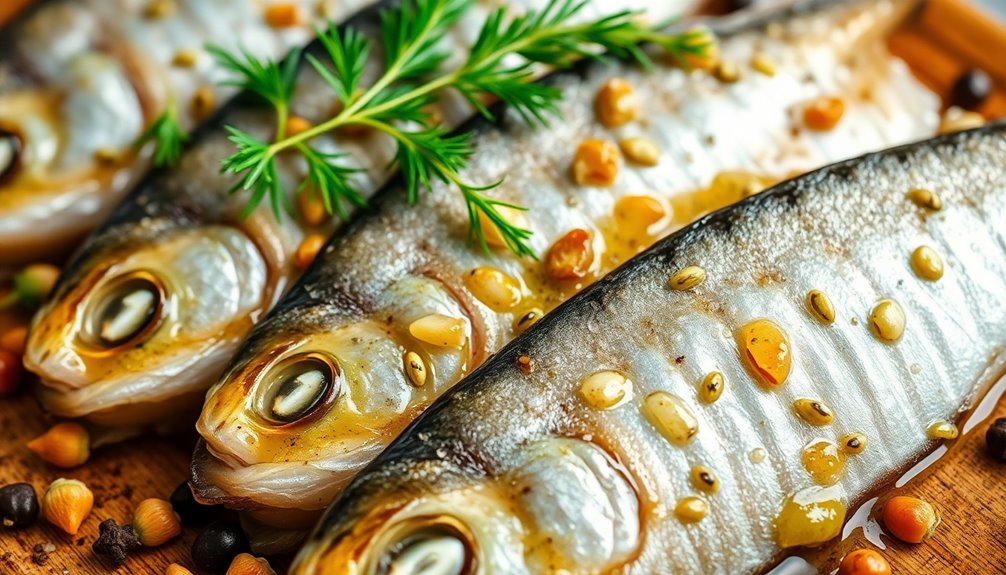
While marinated herring may not be a staple in every kitchen, its unique flavors and nutritional benefits make it worth exploring. This dish, popular in Nordic and Eastern European cuisines, can elevate your meals with its tangy profile.
Rollmops, where herring wraps around gherkins or onions, showcase its versatility. The marination process boosts flavor while preserving the fish, allowing you to enjoy it for longer.
Packed with omega-3 fatty acids, vitamin D3, and selenium, marinated herring is a healthy addition to your diet. Try it with crispy baby potatoes or in a dill potato salad to discover new culinary possibilities.
Don't hesitate—give marinated herring a chance to impress your palate and enhance your meals!
Frequently Asked Questions
What Is a Marinated Herring Called?
When you think of marinated herring, you might come across several terms. One common name is "pickled herring," which often refers to herring preserved in vinegar or brine.
In Germany, it's called "Bismarck herring," named after the famous statesman.
If you're in Nordic countries, you might hear "soused herring," referring to young, immature fish.
Lastly, "rollmops" describes herring fillets rolled around pickles or onions, then pickled—a tasty treat!
How to Marinate Fresh Herring?
"Good things come to those who wait."
To marinate fresh herring, start by filleting the fish and removing any bones.
Then, mix vinegar, water, sugar, and spices like dill or mustard seeds to create your marinade.
Let it blend for 30 minutes.
Submerge the fillets in the marinade and refrigerate for at least 24 hours.
This way, the herring absorbs all those delicious flavors, giving you a tangy, mouthwatering dish.
Are Marinated Herrings Good for You?
Yes, marinated herring can be good for you!
It's packed with omega-3 fatty acids, which support heart health and combat inflammation. A 100-gram serving provides a hefty dose of vitamin D and selenium, both important for your immune system and thyroid function.
Plus, it's rich in vitamin B12, essential for nerve health.
Just keep an eye on the sodium content, as it can be high, so enjoy in moderation!
Why Do Jews Eat Pickled Herring?
You might wonder why pickled herring holds such significance in Jewish culture.
It's often served at festive occasions, symbolizing fertility and prosperity. Enjoying it during Rosh Hashanah represents a wish for a sweet, prosperous year ahead.
The tradition also ties back to Eastern European Jewish communities, where pickling was crucial for food preservation.
